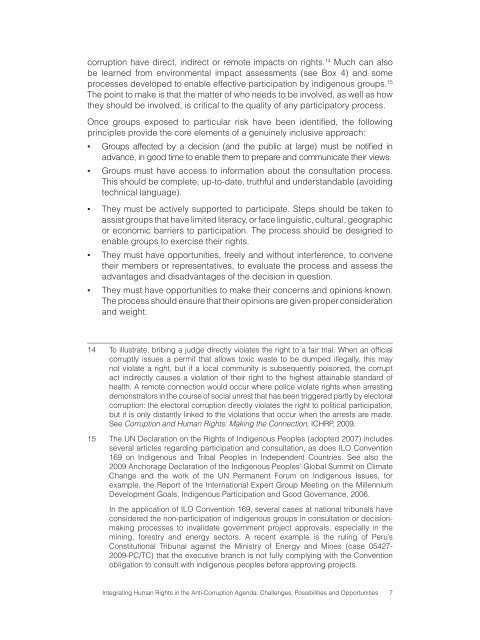Integrating Human Rights in the Anti-Corruption Agenda - The ICHRP
Integrating Human Rights in the Anti-Corruption Agenda - The ICHRP
Integrating Human Rights in the Anti-Corruption Agenda - The ICHRP
Create successful ePaper yourself
Turn your PDF publications into a flip-book with our unique Google optimized e-Paper software.
corruption have direct, <strong>in</strong>direct or remote impacts on rights. 14 Much can also<br />
be learned from environmental impact assessments (see Box 4) and some<br />
processes developed to enable effective participation by <strong>in</strong>digenous groups. 15<br />
<strong>The</strong> po<strong>in</strong>t to make is that <strong>the</strong> matter of who needs to be <strong>in</strong>volved, as well as how<br />
<strong>the</strong>y should be <strong>in</strong>volved, is critical to <strong>the</strong> quality of any participatory process.<br />
Once groups exposed to particular risk have been identified, <strong>the</strong> follow<strong>in</strong>g<br />
pr<strong>in</strong>ciples provide <strong>the</strong> core elements of a genu<strong>in</strong>ely <strong>in</strong>clusive approach:<br />
▪ Groups affected by a decision (and <strong>the</strong> public at large) must be notified <strong>in</strong><br />
advance, <strong>in</strong> good time to enable <strong>the</strong>m to prepare and communicate <strong>the</strong>ir views.<br />
▪ Groups must have access to <strong>in</strong>formation about <strong>the</strong> consultation process.<br />
This should be complete, up-to-date, truthful and understandable (avoid<strong>in</strong>g<br />
technical language).<br />
▪ <strong>The</strong>y must be actively supported to participate. Steps should be taken to<br />
assist groups that have limited literacy, or face l<strong>in</strong>guistic, cultural, geographic<br />
or economic barriers to participation. <strong>The</strong> process should be designed to<br />
enable groups to exercise <strong>the</strong>ir rights.<br />
▪ <strong>The</strong>y must have opportunities, freely and without <strong>in</strong>terference, to convene<br />
<strong>the</strong>ir members or representatives, to evaluate <strong>the</strong> process and assess <strong>the</strong><br />
advantages and disadvantages of <strong>the</strong> decision <strong>in</strong> question.<br />
▪ <strong>The</strong>y must have opportunities to make <strong>the</strong>ir concerns and op<strong>in</strong>ions known.<br />
<strong>The</strong> process should ensure that <strong>the</strong>ir op<strong>in</strong>ions are given proper consideration<br />
and weight.<br />
14 To illustrate, brib<strong>in</strong>g a judge directly violates <strong>the</strong> right to a fair trial. When an official<br />
corruptly issues a permit that allows toxic waste to be dumped illegally, this may<br />
not violate a right, but if a local community is subsequently poisoned, <strong>the</strong> corrupt<br />
act <strong>in</strong>directly causes a violation of <strong>the</strong>ir right to <strong>the</strong> highest atta<strong>in</strong>able standard of<br />
health. A remote connection would occur where police violate rights when arrest<strong>in</strong>g<br />
demonstrators <strong>in</strong> <strong>the</strong> course of social unrest that has been triggered partly by electoral<br />
corruption: <strong>the</strong> electoral corruption directly violates <strong>the</strong> right to political participation,<br />
but it is only distantly l<strong>in</strong>ked to <strong>the</strong> violations that occur when <strong>the</strong> arrests are made.<br />
See <strong>Corruption</strong> and <strong>Human</strong> <strong>Rights</strong>: Mak<strong>in</strong>g <strong>the</strong> Connection, <strong>ICHRP</strong>, 2009.<br />
15 <strong>The</strong> UN Declaration on <strong>the</strong> <strong>Rights</strong> of Indigenous Peoples (adopted 2007) <strong>in</strong>cludes<br />
several articles regard<strong>in</strong>g participation and consultation, as does ILO Convention<br />
169 on Indigenous and Tribal Peoples <strong>in</strong> Independent Countries. See also <strong>the</strong><br />
2009 Anchorage Declaration of <strong>the</strong> Indigenous Peoples’ Global Summit on Climate<br />
Change and <strong>the</strong> work of <strong>the</strong> UN Permanent Forum on Indigenous Issues, for<br />
example, <strong>the</strong> Report of <strong>the</strong> International Expert Group Meet<strong>in</strong>g on <strong>the</strong> Millennium<br />
Development Goals, Indigenous Participation and Good Governance, 2006.<br />
In <strong>the</strong> application of ILO Convention 169, several cases at national tribunals have<br />
considered <strong>the</strong> non-participation of <strong>in</strong>digenous groups <strong>in</strong> consultation or decisionmak<strong>in</strong>g<br />
processes to <strong>in</strong>validate government project approvals, especially <strong>in</strong> <strong>the</strong><br />
m<strong>in</strong><strong>in</strong>g, forestry and energy sectors. A recent example is <strong>the</strong> rul<strong>in</strong>g of Peru’s<br />
Constitutional Tribunal aga<strong>in</strong>st <strong>the</strong> M<strong>in</strong>istry of Energy and M<strong>in</strong>es (case 05427-<br />
2009-PC/TC) that <strong>the</strong> executive branch is not fully comply<strong>in</strong>g with <strong>the</strong> Convention<br />
obligation to consult with <strong>in</strong>digenous peoples before approv<strong>in</strong>g projects.<br />
<strong>Integrat<strong>in</strong>g</strong> <strong>Human</strong> <strong>Rights</strong> <strong>in</strong> <strong>the</strong> <strong>Anti</strong>-<strong>Corruption</strong> <strong>Agenda</strong>: Challenges, Possibilities and Opportunities

















